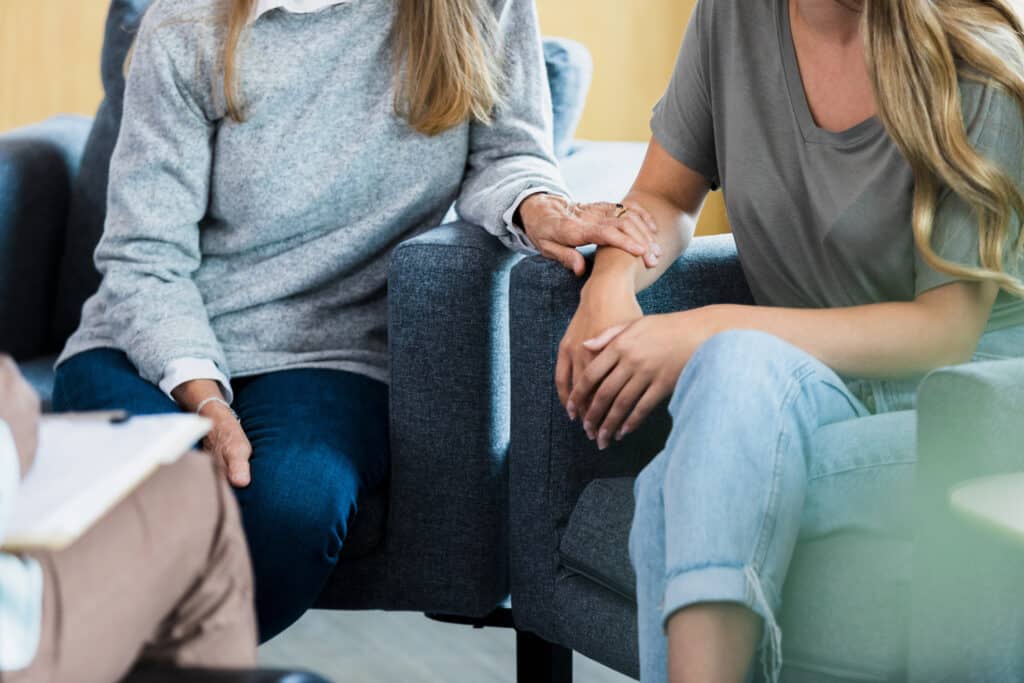Addiction and recovery are extremely personal experiences. If you’ve experienced either, you know how isolating they can be. No matter what outside forces affect you, ultimately, you are the one responsible for your actions.
However, we are relational beings, and we require the company and support of others and society as a whole in order to survive. This is the idea behind the centuries-old expression, “No man is an island.”
Its application to coping with addiction and recovery is clear: Family, whether biological or chosen, is especially impacted by your addiction and can play an integral role in your recovery.

How Does Addiction Affect the Family Dynamic?
The family unit is made up of individuals, but those individuals are deeply connected and affected by one another. When healthy, a family works as a balanced ecosystem with secure connections and well-established boundaries.
But if one member is unhealthy, that ecosystem is thrown off balance. Addiction in families creates an unbalanced ecosystem where other family members adopt unhealthy coping mechanisms or family roles as they try to get back to some type of balance.
Unhealthy Coping Mechanisms
When addiction affects a family, members often develop coping mechanisms that do more harm than good. A partner might avoid confrontation to keep the peace, while a child might take on extra responsibilities to ease tension.
Blurring of Boundaries
Addiction blurs family boundaries as roles shift in unhealthy ways. A child may take on parental duties like managing finances or caring for siblings, while a parent might protect the addict by covering for them. These changes create confusion, strain relationships, and make it harder to set healthy limits.
Codependency
Codependency happens when family members become so focused on the addict that they neglect their own needs. They may try to control or “save” the addict by preventing consequences or taking on extra responsibilities, like a partner paying their bills or a parent covering for bad decisions.
This shielding prevents the addict from facing the results of their actions, making change harder. Over time, family members lose their sense of self, prioritizing the addict’s needs and sustaining the cycle of addiction.
Emotional Turmoil
Addiction creates constant emotional dysregulation and chaos. Family members feel like they’re walking on eggshells, not knowing when the next outburst or crisis will happen. This emotional stress can make it hard to trust each other, and the tension wears everyone down. As the turmoil continues, it becomes harder to find moments of peace or reassurance.
Isolation
Addiction often leads to isolation as family members feel ashamed or embarrassed. They may avoid socializing or discussing the problem, making them feel alone in their struggles. Without outside support, they become trapped in the chaos of addiction, making it harder to seek help and break the cycle.

The Roles of Family Members in Addiction
When addiction takes root, each family member often falls into a specific role to try and cope with the chaos and dysfunction. Each role acts as a coping mechanism but doesn’t provide real solutions.
Over time, these roles become ingrained, leading to unhealthy dynamics and emotional burdens that are hard to escape. Here’s a look at how they play out in a family facing addiction:
1. Addict
The addict is the person struggling with substance abuse, whose primary coping mechanism is turning to alcohol or drugs. This family member often isolates themselves and fractures relationships within the family, sometimes blaming others for their problems.
Their inability or unwillingness to recognize the damage they’re causing makes it hard for the family to heal. The addict’s behavior often leaves others feeling helpless, frustrated, and emotionally drained, as their actions disrupt the family’s stability.
2. Enabler or Caretaker
The enabler’s role is to protect the addict by making excuses or covering up their behavior. This person is typically in denial about the extent of the addiction, often hiding it from others to maintain the appearance of a functioning family.
They may step in to take over responsibilities, such as paying bills or taking care of household duties, to keep things from falling apart. While they may believe they’re helping, this behavior only enables the addiction to continue.
The enabler’s fear of confrontation or shame about the addiction often keeps them from addressing the problem directly, which allows the cycle to persist.
3. Hero
The hero is often the responsible overachiever in the family, someone who tries to make up for the dysfunction by excelling in other areas of life. They might become overly successful at school, work, or in social settings, trying to “save face” for the family.
This person often takes on a lot of responsibility and seeks control, trying to create an illusion of normalcy. They are typically perfectionists, driven by a desire to fix what feels broken, but they often feel the pressure of carrying the family’s emotional burden on their own.
While their success might seem like a positive trait, it’s often rooted in a need to overcompensate for the chaos caused by addiction.
4. Scapegoat
The scapegoat is the person in the family who is blamed for all the problems. This individual often acts out, whether by getting into trouble or deflecting attention away from the addict’s behavior.
They might get labeled as the “bad kid” or the “problem child” even though their actions are often a reaction to the family’s dysfunction. By focusing on the scapegoat, the family avoids confronting the addict’s issues, allowing the addiction to continue unchecked.
5. Mascot or Clown
The mascot or clown tries to bring humor into an otherwise tense and uncomfortable family environment. This person uses jokes, antics, or playful behavior to deflect attention from the addiction and lighten the mood.
They may be seen as the “class clown” or the family entertainer, but this is often a defense mechanism to avoid dealing with their own emotions. Humor becomes their shield against the overwhelming sadness, anger, or anxiety they may feel.
While they may provide temporary relief from the tension, their behavior often masks the deeper emotional issues within the family.
6. Lost Child
The lost child is the quiet, withdrawn member of the family who copes by avoiding attention. They often fly under the radar, trying to stay unnoticed to avoid the chaos and conflict around them.
This person may retreat into themselves, spending time alone or staying disengaged from family matters. While they may seem like they’re unaffected by the addiction, they’re often deeply lonely and emotionally disconnected.
The lost child’s withdrawal is a coping mechanism that prevents them from confronting the family’s problems, but it also stops them from seeking the support they need to heal.

How Family Roles Affect Addiction Recovery
While addiction is undoubtedly hard on families, recovery can come with its own set of difficulties. If a family has found an equilibrium, albeit unhealthy, with you and your addiction, your decision to seek recovery will naturally upset the equilibrium.
This is just one reason why addiction treatment and family involvement should ideally go hand in hand. In addition to establishing healthy habits as an individual while you’re in recovery, you also need to learn how to have healthy relationships with family members and other loved ones.
Healing Together
Because relationships are a two-way street, the best results will come when both of you are seeking healing. And there’s likely to be a lot of healing needed in the family of a person recovering from addiction or mental illness.
So, while family members can be a great source of support, they may need to go through their own version of “recovery” before they can be there for you in yours. Family counseling or therapy services can help everyone in the family navigate the complicated and changing dynamics of relationships in recovery.
Ways Families Can Support Addiction Recovery
Fortunately, family members can also be your biggest champions in recovery, offering support, encouragement, accountability, and hope as you seek healing. They are the ones most likely to be there for you, no matter where you are in your journey. And their support can come in all shapes and sizes. Some family support examples include:
- Emotional support and help with goal setting
- Financial support during and after addiction treatment
- Stable home environment
- Accountability for coping with addiction and maintaining sobriety
- Unconditional love for inevitable missteps and mistakes along the way
If you haven’t lately, take some time to appreciate the family, biological or chosen, who has been with you through your addiction and supported you in your recovery. It’s good to reach out to those you love to tell them how thankful you are for them.

Addiction Recovery and Family Support
So how can you provide much-needed family support during your loved one’s recovery process? The Substance Abuse and Mental Health Services Administration (SAMHSA) offers some practical guidance:
- Express Your Support: Communicate with your loved one that you’re there to support them along the way.
- Be Transparent: If you have a family history of alcohol or drug use, be willing to share this with your loved one. This helps them feel that they’re not alone in their struggles.
- Show Empathy and Understanding: Be patient and show compassion to your loved one as the process can take some time.
- Care for Yourself: Your loved one’s addiction recovery can be stressful and emotionally draining on you as well. Self-care and family counseling can help you stay healthy as you navigate this together.
Contact Us Today for Personalized Addiction Treatment
If you or someone you love has been struggling with addiction, it’s important you know that long-term recovery is possible with the right treatment program. Here at The Meadows, our alcohol rehab and drug addiction treatment programs take a holistic approach to recovery, addressing not just your symptoms, but the true underlying causes of your addiction.
We also offer guidance and support for family members, helping them navigate their own journey alongside yours. With the right support, both you and your family can heal together.
This means your long-term sobriety and the healthier, more fulfilling life you deserve can be finally within reach. If you’re ready to take the first step toward recovery, contact us today.



